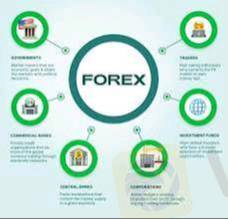
2025-02-06 14:16
IndustryForex as economy circle
#firstdealofthenewyearastylz
Forex (foreign exchange) operates as a key component of the global economic cycle, facilitating international trade, investment, and monetary stability. Here's how it fits into the broader economic cycle:
1. Currency Supply & Demand
Forex is driven by supply and demand for different currencies, influenced by trade balances, interest rates, and economic conditions.
Countries with strong economies often see their currencies appreciate due to higher demand.
2. Trade & Investment Flow
Businesses and governments use Forex markets to convert currencies for trade and investment.
A nation with a trade surplus (exports > imports) often experiences currency appreciation, while trade deficits can weaken a currency.
3. Inflation & Interest Rates
Central banks adjust interest rates to control inflation and economic growth.
Higher interest rates attract foreign investors seeking better returns, boosting currency value.
4. Economic Growth & Employment
A strong currency can make imports cheaper, reducing inflation but potentially harming exports.
A weak currency can boost exports but may lead to inflation due to higher import costs.
5. Market Speculation & Sentiment
Traders in Forex markets react to economic data, political events, and global crises, influencing currency volatility.
Speculation can cause short-term fluctuations but often aligns with long-term economic trends.
6. Crisis & Recovery
Economic downturns can lead to currency depreciation as investors move to safer assets (e.g., USD, gold).
During recovery, currencies often regain strength as economic confidence returns.
Forex acts as a real-time economic indicator, reflecting a nation's financial health, policies, and global economic trends. It also plays a stabilizing role by allowing currency adjustments to balance economies over time.
Like 0

Zenny4316
Broker
Hot content
Industry
Event-A comment a day,Keep rewards worthy up to$27
Industry
Nigeria Event Giveaway-Win₦5000 Mobilephone Credit
Industry
Nigeria Event Giveaway-Win ₦2500 MobilePhoneCredit
Industry
South Africa Event-Come&Win 240ZAR Phone Credit
Industry
Nigeria Event-Discuss Forex&Win2500NGN PhoneCredit
Industry
[Nigeria Event]Discuss&win 2500 Naira Phone Credit
Forum category

Platform

Exhibition

Agent

Recruitment

EA

Industry

Market

Index
Forex as economy circle
 Nigeria | 2025-02-06 14:16
Nigeria | 2025-02-06 14:16#firstdealofthenewyearastylz
Forex (foreign exchange) operates as a key component of the global economic cycle, facilitating international trade, investment, and monetary stability. Here's how it fits into the broader economic cycle:
1. Currency Supply & Demand
Forex is driven by supply and demand for different currencies, influenced by trade balances, interest rates, and economic conditions.
Countries with strong economies often see their currencies appreciate due to higher demand.
2. Trade & Investment Flow
Businesses and governments use Forex markets to convert currencies for trade and investment.
A nation with a trade surplus (exports > imports) often experiences currency appreciation, while trade deficits can weaken a currency.
3. Inflation & Interest Rates
Central banks adjust interest rates to control inflation and economic growth.
Higher interest rates attract foreign investors seeking better returns, boosting currency value.
4. Economic Growth & Employment
A strong currency can make imports cheaper, reducing inflation but potentially harming exports.
A weak currency can boost exports but may lead to inflation due to higher import costs.
5. Market Speculation & Sentiment
Traders in Forex markets react to economic data, political events, and global crises, influencing currency volatility.
Speculation can cause short-term fluctuations but often aligns with long-term economic trends.
6. Crisis & Recovery
Economic downturns can lead to currency depreciation as investors move to safer assets (e.g., USD, gold).
During recovery, currencies often regain strength as economic confidence returns.
Forex acts as a real-time economic indicator, reflecting a nation's financial health, policies, and global economic trends. It also plays a stabilizing role by allowing currency adjustments to balance economies over time.
Like 0
I want to comment, too
Submit
0Comments

There is no comment yet. Make the first one.

Submit
There is no comment yet. Make the first one.